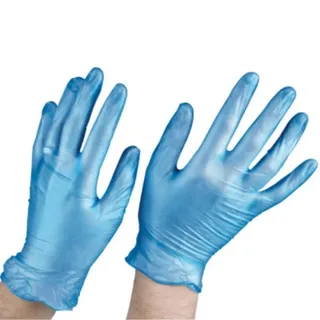In a world where sustainability has become more than a trend, the demand for eco-friendly products is skyrocketing. Consumers are increasingly seeking alternatives that serve their needs and respect our planet. One such product gaining traction across various industries is Vinyl gloves. These versatile hand protectors have long been staples in healthcare, food service, and cleaning. However, as awareness about environmental issues grows, so does the spotlight on how these everyday items impact our ecosystem?
As businesses and individuals alike strive for greener choices, it’s essential to understand Vinyl-gloves and why they’ve become popular—along with the pressing need to explore sustainable options within this category. Join us as we delve into the advancements in eco-friendly vinyl glove technology and discover how making informed choices can benefit your health and our environment.
What Are Vinyl-gloves, And Why Are They Popular In Different Industries?
Vinyl-gloves are made from synthetic materials, primarily polyvinyl chloride (PVC). They are popular in various industries due to their affordability and versatility.
These gloves provide a reliable barrier against contaminants while allowing for ease of movement. Many businesses appreciate that Vinyl-gloves offer decent protection without the higher costs associated with latex or nitrile options.
Some of the industries that commonly use Vinyl-gloves include:
- Healthcare: Vinyl-gloves are widely used in healthcare settings, including hospitals, clinics, and nursing homes. They protect medical professionals when handling bodily fluids, performing examinations, or administering medications.
- Foodservice: Vinyl-gloves are also popular in the industry. They provide a barrier between hands and food products to prevent contamination. Chefs, food handlers, and servers commonly use them.
- Janitorial and cleaning services: In janitorial and cleaning industries, Vinyl-gloves protect workers’ hands from harsh chemicals and cleaning agents while they perform their tasks.
- Beauty and salon services: Hairdressers, nail technicians, and other beauty professionals often wear Vinyl-gloves to protect themselves from chemicals found in hair dyes, nail polishes, and other products.
- Laboratory work: Vinyl-gloves are a cost-effective option for protecting workers’ hands during experiments or sample handling in labs with minimal exposure to hazardous materials.
- Automotive industry: Mechanics and auto body workers often use Vinyl-gloves to protect their hands from oils, solvents, and other chemicals they may contact while working on vehicles.
Overall, Vinyl-gloves comply with hygiene standards during procedures. In food service, Vinyl-gloves help maintain cleanliness while preparing meals. Their waterproof nature also makes them suitable for tasks involving liquids.
Moreover, Vinyl-gloves come in various sizes and thicknesses, catering to diverse needs across sectors such as cleaning, automotive work, and beauty services. This adaptability contributes significantly to their widespread adoption in professional environments where safety is paramount.
The Environmental Impact Of Traditional Vinyl-gloves
While widely used for convenience and affordability, traditional Vinyl-gloves pose significant environmental challenges. Made from polyvinyl chloride (PVC), these gloves can take hundreds of years to decompose in landfills. During this time, they break down into micro plastics that contaminate soil and waterways. The production process itself is not eco-friendly either. PVC manufacturing releases harmful chemicals into the atmosphere, contributing to air pollution and greenhouse gas emissions.
Additionally, the sheer volume of single-use Vinyl-gloves generated daily exacerbates waste management issues worldwide. Many users are unaware that these seemingly harmless products have a ripple effect on ecosystems and human health long after disposal. Sustainable alternatives present an opportunity to significantly reduce this environmental burden.
Advancements In Eco-Friendly Vinyl Powder Free Gloves
Recent innovations in eco-friendly vinyl powder free gloves focus on sustainable materials that maintain safety and comfort. Manufacturers are now using bio-based additives, significantly reducing the reliance on petroleum products.
- These advancements enhance the biodegradability of Vinyl-gloves without compromising their durability. Some companies even integrate recycled content into their production processes, minimizing waste.
- Moreover, many new eco-friendly options meet rigorous industry standards for quality and performance. This ensures businesses don’t have to sacrifice protection while adopting greener practices.
- Another breakthrough worth mentioning is the use of water-based adhesives. These eliminate harmful solvents traditionally found in glove production, making manufacturing more environmentally friendly.
With ongoing research and development, we can expect further enhancements to make these gloves even safer for users and the planet.
Benefits Of Switching To Eco-Friendly Disposable Vinyl Gloves
Switching to eco-friendly disposable Vinyl gloves brings numerous advantages for both businesses and consumers. These gloves are made from sustainable materials, reducing the carbon footprint associated with traditional options. Adopting eco-friendly practices can enhance a business’s brand reputation. Customers increasingly prefer companies prioritising sustainability, leading to customer loyalty and potentially increased sales.
Consumers benefit from using products that are safer for their health. Eco-friendly Vinyl-gloves often contain fewer harmful chemicals than conventional alternatives, making them a better choice for personal use. Cost-effectiveness is another key factor. Many eco-friendly options provide similar performance at competitive prices, ensuring quality without compromising on budget.
Case Studies Of Companies
One notable example is a leading food service company that switched to eco-friendly Vinyl-gloves. By making this change, they reduced their plastic waste by 30% within the first year. This commitment enhanced their brand image and resonated with environmentally conscious consumers. Another case involves a healthcare provider that adopted sustainable glove practices across its facilities. They reported significant savings in disposal costs while maintaining compliance with safety standards.
A cosmetic brand also joined the movement by opting for biodegradable Vinyl-gloves during product testing and application. Their decision attracted attention from customers who value sustainability, boosting sales and customer loyalty in an increasingly competitive market. These companies demonstrate that embracing eco-friendly Vinyl-gloves can lead to environmental benefits and improved business outcomes.
How Consumers Can Make A Difference By Choosing Eco-Friendly Options?
Every choice we make adds up. Consumers opt for eco-friendly Vinyl-gloves, contributing to a healthier planet.
- Choosing these sustainable products sends a message to manufacturers. It demonstrates that there is a strong demand for greener alternatives. This can prompt companies to invest in more environmentally friendly practices.
- By supporting brands committed to sustainability, individuals help create a market shift. Each purchase encourages innovation and accountability in the industry.
- Furthermore, sharing knowledge about eco-friendly options amplifies the impact. Conversations with friends or family can spark interest and encourage others to make mindful choices.
Even small actions matter. Opting for eco-friendly Vinyl-gloves helps reduce waste and pollution over time. Simple decisions like this pave the way toward more considerable systemic changes in consumption habits across various sectors.
The Negative Impact Of Traditional Vinyl-gloves On The Environment
Traditional Vinyl-gloves pose significant environmental challenges. Made primarily from polyvinyl chloride (PVC), their production is energy-intensive and releases harmful chemicals into the atmosphere. Once discarded, these gloves can take years to decompose, contributing to overflowing landfills. They often release toxic substances that contaminate soil and waterways when they break down.
Moreover, improper disposal leads to plastic pollution in oceans, which affects marine life and ecosystems. Sea creatures ingest or become entangled in discarded gloves, disrupting their habitats. The widespread use of traditional Vinyl-gloves heightens the urgency for sustainable alternatives. As industries rely on disposable options without considering ecological ramifications, the need for responsible choices becomes ever more apparent.
Comparison With Other Types Of Sustainable Gloves
Several factors come into play when comparing eco-friendly Vinyl-gloves to alternatives like latex and biodegradable options. Latex gloves are known for their elasticity and comfort but can cause allergic reactions in some users, which limits their application across various industries. Biodegradable gloves offer an alternative by breaking down more quickly in landfills. However, they may lack the durability required for extensive use in healthcare or food industries.
Eco-friendly Vinyl-gloves strike a balance between performance and sustainability. They provide a barrier against contaminants while being free from harmful chemicals often found in traditional options. Additionally, manufacturers are increasingly adopting innovative materials that enhance biodegradability without sacrificing strength. This ensures that every glove contributes less to environmental waste than conventional products. Each type of sustainable glove has merits; choosing the right one depends on specific industry needs and environmental goals.
Safety And Regulations Surrounding The Use Of These Gloves
Safety is paramount when using Vinyl-gloves in any industry. These gloves must meet strict standards set by organizations such as the FDA and ASTM. Compliance ensures they are safe for contact with food, medical procedures, and chemical handling.
- Each glove type undergoes rigorous testing to assess its durability and protective capabilities. These include resistance to punctures, chemicals, and tears—key factors for maintaining safety in various environments.
- Regulations also dictate labelling requirements. Consumers need clear information about materials used and certifications achieved by manufacturers. Transparency builds trust between producers and users.
- Proper glove-use training adds another layer of safety. Employees should understand when to wear gloves, how to dispose of them correctly, and what alternatives exist if allergies or sensitivities arise.
Adhering to these regulations protects individuals and promotes a culture of responsibility within businesses across different sectors.
Conclusion
The shift toward eco-friendly Vinyl gloves represents a pivotal change in various industries. Businesses are recognizing the importance of sustainability, not just for compliance but as a core value. These gloves offer safety without compromising environmental integrity. Consumers also play an essential role in this transition. Their choices can drive demand for more sustainable options and encourage manufacturers to adopt greener practices. Each small switch counts. Businesses and consumers can foster significant progress towards reducing waste and promoting eco-conscious habits across all sectors.
FAQS
What are Vinyl gloves made of?
Vinyl gloves are primarily made from polyvinyl chloride (PVC), a synthetic plastic polymer. This material makes them affordable and versatile, making them a popular choice across various industries.
Are eco-friendly Vinyl-gloves biodegradable?
While traditional Vinyl-gloves take years to decompose, advancements in eco-friendly technology have introduced options that may contain biodegradable additives. These innovations aim to reduce the environmental footprint associated with disposal while still providing the necessary protection and durability.
How about I choose an eco-friendly option?
To identify genuinely eco-friendly Vinyl-gloves, look for certifications or labels indicating sustainable production methods or materials used. Brands committed to sustainability often provide transparency about their manufacturing processes and sourcing practices, allowing consumers to make informed choices.



